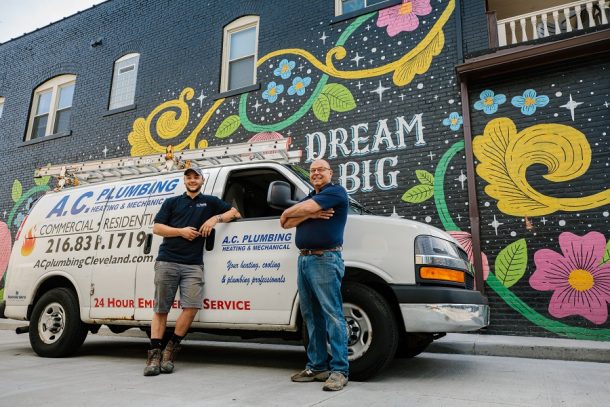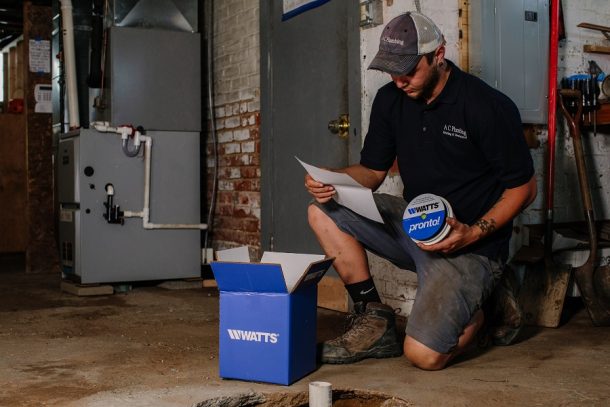Starting your career as a plumber has provided you with a whole host of skills that have helped you to improve your relationships with clients and provide outstanding service. Throughout your training and during real life experience, you have come to realize that there are a handful of good practices that every plumber should know Read more
Professionalism

Starting your career as a plumber has provided you with a whole host of skills that have helped you to improve your relationships with clients and provide outstanding service. Throughout your training and during real life experience, you have come to realize that there are a handful of good practices that every plumber should know about. These simple, but effective practices not only help you to improve professional relationships with clients, but it will also enhance your business reputation too. Whether you’re making sure you clean up properly at the end of a job, or you’re providing an honest and transparent overview of the tasks at hand, you will find that these practices will give you a great advantage when it comes to growing your business. Hopefully, you can start to incorporate these ideas into the way you work on a daily basis so that you are always putting your best foot forward when you’re carrying out jobs for clients in your ideal demographic.

Friendliness
Having a friendly tradesman on your side is a very reassuring thing for a customer to experience. When someone has an issue with the plumbing in their home it can be very worrying and anxiety inducing, because they won’t know how easily the problem can be fixed. If you are able to put their mind at ease using a friendly tone and manner, they will feel much happier and comfortable whilst you carry out the job.
Cleaning Up After a Job
A clean and tidy plumber is a well-respected one, so it’s always a good idea to take the relevant tools along to each job with you. As well as fixing pipes, leaks and other plumbing issues, you also need to show that you respect peoples’ homes, so a thorough clean-up is a must every single time. You may want to invest in a portable dust collector to help you remove harmful particles that build up whilst you’re carrying out your job. Removing excess dust will not only help to keep the area safe, but it will also ensure that your customer is happy with the overall job too. Although you don’t necessarily have to clean up the are until it’s spotless, you should try and leave it in the state you left it so that you haven’t caused any unnecessary mess.
Good Communication
From the moment you come into contact with your potential clients and customers, you need to make sure you provide good communication. Most plumbing issues are fairly urgent, which can be very unsettling to homeowners and business owners looking to get the job done as fast as possible. If you’re able to communicate effectively and efficiently with your customers, you will create a strong working relationship from the very beginning. It is very reassuring when tradespeople communicate well via phone calls, emails and text messages as it gives your business a good name and professional vibe from the outset. As soon as you start prioritizing communication, you will start to see an increase in customer referrals as they will feel extremely happy with the service they experienced with you.
Professionalism When Working
Every plumber has their own way of working, depending on your style. No matter how familiar you are with a client, you should always respect their home and carry out work in a professional manner. Try to avoid talking on the phone, using social media or listening to loud music whilst you’re working on the task at hand. Provide regular updates to your client when needed and show respect for their home and surroundings.
Sticking to Deadlines
Try not to make promises to your clients if you know it’s going to be difficult to deliver on these promises. Sticking to deadlines is extremely important as this shows that you can be trusted as a plumber. If you are able to provide clear updates when you’re carrying out a job it will put your client’s mind at ease right away. Don’t feel worried about telling them about a delay due ordering a new part. Communication goes a long way when it comes to getting the job done and your customer will be much happier if you can keep them in the loop with deadlines as and when they may change.
Honesty and Transparency
As a business owner, it’s so important to practice honesty and transparency no matter what stage in business you are at. Whether you’re first starting out or you’ve been in the industry for decades, you need to show honesty throughout every task you undertake. This could mean being open about pricing from the moment someone requests a quote from you. Lying to your customers or playing down an issue could lead to bigger complications and it will break the trust between you and your client.
Putting Safety First
When you’re working as a plumber, it is so important to take safety seriously and prioritize it as often as possible. Keeping pets and children in the household away from your workspace is a must, so that there are no unforeseen accidents in the area. You should also take measures to protect yourself whilst working too so that you are always safe and following protocols whilst in other peoples’ homes and establishments.
As you can see, there are a whole host of different best practices to help you move your business forward and create a positive brand name for your business. Whether you’re working for an agency as a plumber, or you’re representing your own company, you should always be willing to go the extra mile and make sure your customers receive the best possible service from you. From safety procedures to cleaning guidelines, you can always go above and beyond to provide an excellent service for your clients. Hopefully, you are already familiar with most of the ideas set out ahead of you, but with a little extra care and attention you can do an even better job when it comes to providing outstanding plumbing services every single time.

People have been spending a lot more time at home due to the covid pandemic, and even though things are beginning to level out a little, it still means there is more plumbing work to be done because people are using more water and heating their homes more often. However, due to the unfortunate amount Read more
People have been spending a lot more time at home due to the covid pandemic, and even though things are beginning to level out a little, it still means there is more plumbing work to be done because people are using more water and heating their homes more often. However, due to the unfortunate amount of people who have been put out of work due to covid, there are a lot more plumbers out there who have just started out and are eating into the sales of long term plumbers. There’s nothing wrong with this, it’s just business. But it does mean plumbers are looking for extra work. Here are some tips worth considering.

Check Professionalism Standards
This isn’t to say you aren’t professional. It’s just to reaffirm a couple of areas which you may want to pick up on. It doesn’t even concern the work you carry out (which will of course be to a high standard), or whether you’re using a tennant t7 or a titanium tubing cutter. It’s the simple things. Following up on a job with a text or email to ask how things are looking and whether the repair held or if it completely sorted the issue. This also builds on the chance of you receiving a positive review. Wearing shoe covers so you don’t walk mud through a home, keeping a mask on with regional regulations, etc. These little things are what can leave a big impact on a lot of people and lead them to recommending you to others. Keep them in mind and you’ll see more sales role in.
Use Social Media
So many people will search for tradespeople on social media these days instead of searching on Google or Bing. That’s how powerful social media has become. It’s why you really need to ensure you have a presence. Set up your business page with a powerful logo and your key business information including number, email address, or instant messaging facilities. It also provides a great platform for reviews. If they find you on Facebook, when you’ve completed the job you can ask for a review on Facebook which will again pull in more sales. It’s a great way of interacting with your local community.
Build Search Engine Visibility
Go to google and search for plumber in … (wherever you operate) and see what comes up. That’s where you need to be. On the first page, offering a free quotation, or no obligation quotation. How? You need a website, you can create one for free. You then need to build some useful content on your website. Being searchable is huge and will directly increase your sales. You can get help with this from SEO specialists but in reality you can do it yourself if you have the time so long as you can get some decent content on there. It also builds on the professionalism of you and your business. People do look for websites these days and having one will set you apart from those that don’t.

Callbacks are often preventable—if you understand the common causes. Learn how to reduce callbacks, maintain your reputation and boost productivity with a few best practices. “I’m not happy with the work.” They are the words no contractor ever wants to hear. They mean less attention to other jobs, a smaller profit margin and the potential loss Read more
Callbacks are often preventable—if you understand the common causes. Learn how to reduce callbacks, maintain your reputation and boost productivity with a few best practices.
“I’m not happy with the work.” They are the words no contractor ever wants to hear. They mean less attention to other jobs, a smaller profit margin and the potential loss of future business.
Callbacks can hurt a business’ reputation in several ways. First, referrals are adversely affected when homeowners talk with one another and share their unpleasant experiences. And when those same homeowners take their displeasure online and leave negative reviews online and on social media, the impact can be much more permanent. Finally, callbacks can also hurt a company’s productivity by inhibiting the ability of the team to move on to other projects.
The good news? Many callbacks are preventable. Here’s a rundown of three key strategies for avoiding them.
Educate the Customer
Very often, customer satisfaction comes down to one very important factor: A contractor’s ability to manage customer expectations.
“We get fewer callbacks when we educate the client about things like materials and warranties,” says Cal Phillips, who has owned and operated the Denver-based Eco Paint since 1990 and has been painting homes since 1977. “We’re the professionals, so it’s up to us to educate the client so they can care for their home.”
Education should start as early as the initial onsite visit. Managing a customer’s expectations is essential, especially when it comes to color variations, service parameters and ongoing maintenance.
And consumer education doesn’t stop after the last coat is applied. Phillips makes sure his clients understand their responsibilities for continued care after the job is completed.
“On an exterior project, we’ll let a client know that the paint needs to be maintained by making sure sprinklers are properly adjusted, with gutters and downspouts in good operation so that water is adequately removed from painted surfaces,” he says. “We also inform them to keep vegetation pruned back away from the substrate.”
This kind of dialog does more than help prevent callbacks. It can also instill a trust factor with your customers that tells them you care about the lasting quality of your work, even after the job is complete. And that can have the fringe benefit of turning first-time customers into repeat clients.
Maintain Clear Communication — Inside the Office and Out
Rarely is poor work the reason painters get called back to a job site. The most common reason is poor communication. Communication breakdowns between estimators and painters or between painters and customers can result in mistakes. Like applying an accent color to the wrong wall or painting trim the customer had wanted untouched. That can often mean lost productivity and bad customer reviews.
At Two Dudes Painting, a leading commercial and residential painting company in Lancaster, PA, painters receive a copy of the client’s paperwork to ensure everyone understands what the client has signed off on.
Samantha Seifried, who holds the role of Client Advocate at Two Dudes, says for longer projects, the company encourages clients to communicate with painting crews.
“When a project lasts more than a couple of days, we strongly encourage homeowners to review the work daily and let us know if they see errors or details they’re not happy with,” says Seifried. Regular dialog with the customer makes the company more efficient—and clients are more satisfied—because if errors crop up, painting crews can make corrections while they’re still on site, rather than having to come back after they’ve committed to another job.
Re-scope the Job When Needed
When customers fail to understand the process or timeline, or ask their painting contractor to perform work outside their area of expertise — carpentry or electrical work, for example — professional painters can sometimes find themselves tasked with a job in which they’re less-than-comfortable. Painters may not have experience in carpentry, drywall finishing or electrical work, and therefore trying to perform work in these areas could end up worsening jobsite problems. Knowing when to call in a specialist, as well as rescope the job with the customer, is crucial to ensuring your work and reputation remain intact.
For companies that offer a variety of service lines, it makes sense for crew members to request assistance from others who specialize in that line of work when needed. Trusting your field staff and giving them the authority to call and ask for help if they feel uncomfortable taking on certain aspects of a project can reduce callbacks significantly, since certain contractors have more experience in certain areas than others.
For smaller companies or one-to two-person crews, it makes sense in such cases to simply recommend an outside contractor to tackle repairs that fall outside the scope of the painting job. This is especially true with exterior paint projects, where it’s not uncommon to run into damage like rotted wood. It may be the last thing small painting companies (or homeowners, for that matter) want to hear, but in the end, the customer will appreciate your honesty and have a better overall experience because of it.
In the end, callbacks can cost a painting company dearly, both in reputation and production. It’s essential to take proactive steps to prevent them if you want to build a more profitable business.
“We don’t want callbacks,” Seifried says. “But, more than that, we want great reviews and ratings. That’s why we work so hard to deliver a whole project experience.”
 Diane Walsh is Vice President of Market Development and Sales Operations for ShurTech Brands, LLC, maker of FrogTape® brand painter’s tape. Diane also serves as director of the ShurTech Brands Professional Paint Advisory Board, working with leading contractors from across the country to explore industry trends and share innovations for the benefit of the entire trade. Diane was awarded 2018 PDCA Associate Member of the Year.
Diane Walsh is Vice President of Market Development and Sales Operations for ShurTech Brands, LLC, maker of FrogTape® brand painter’s tape. Diane also serves as director of the ShurTech Brands Professional Paint Advisory Board, working with leading contractors from across the country to explore industry trends and share innovations for the benefit of the entire trade. Diane was awarded 2018 PDCA Associate Member of the Year.
